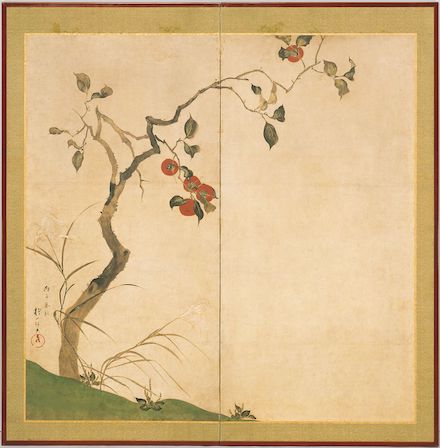
|
|
|
|
|
| Issue 14: | August 2022 |
| Poem: | 141 words |
By Charles D. Tarlton
Forbidden Fruit

...the texture of persimmons,
in your palm, the ripe weight.
—Li-Young Lee*
As with the last of anything,
they seem forgotten,
words dissembled, tossed in the air,
the slight suggestion of ruin, of despair.
Once, on a hilly road in Germany, a light snow
had fallen, and we saw in leafless apple orchards
where autumn’s pickers had left a few
red apples hanging at the top,
like Christmas ornaments forgotten
on discarded trees.
Here four persimmons weighing down
a slender branch, succumb
to gravity,
while higher up a lone
persimmon struggles to fly against 柿 kaki
its slender tether, like a helium balloon on a string.
Yet, somehow, the meanings here
delude us. It is a lonely certainty
capturing the essences of being
lost, someone or a day.
Is there
a wind still stirring in the scant leaves?
* Footnotes:
Links below were retrieved on 22 July 2022:
1. Image reproduced above is Persimmon Tree (two-panel folding screen, ink and color on paper; 1816) by Sakai Hōitsu (1761-1828), held by The Metropolitan Museum of Art:
https://www.metmuseum.org/art/collection/search/45392
2. Epigraph by Li-Young Lee is from his poem “Persimmons” in Rose (BOA Editions, 1986), which also appears online at Poetry Foundation: https://www.poetryfoundation.org/poems/43011/persimmons
3. 柿 kaki: The Japanese persimmon (Diospyros kaki).
Charles D. Tarlton
is a retired university professor of political theory who lives in Old Saybrook, Connecticut with his wife, Ann Knickerbocker (an abstract painter), and a Standard Poodle named Nikki. He is the author of three books of prosimetra published by KYSO Flash Press: Touching Fire: New and Selected Ekphrastic Prosimetra (2018), Get Up and Dance (2019), and Carmody & Blight: The Dialogues (2019).
His most recent book, Peaches and Roses: Episodes in the Navajo Degradation, was released in January 2021 by Silver Bow Publishing (New Westminster, British Columbia). He also has a poetry e-chapbook published in the 2River series, La Vida de Piedra y de Palabra: Improvisations on Pablo Neruda’s Macchu Picchu; an experimental prosimetrum in Lacuna entitled Five Episodes in the Navajo Degradation; “The Rock in a Jar,” an extended prose poem in several parts in Gone Law 32; and “The Turn of Art,” a short prosimetrical drama pitting Picasso against Matisse, in Fiction International.
Tarlton has been writing poetry and flash fiction since 2006, and his work is published in numerous literary journals and magazines: Abramelin, Atlas Poetica, Barnwood, Blackbox Manifold (UK), Blue and Yellow Dog, Book Ends Review, Clackamas Literary Review, Contemporary Haibun Online, Cricket Online Review, Dark Matter, Fiction International, Haibun Today, Ilanot Review, Inner Art Journal, Innisfree Poetry Journal, Jack Magazine, KYSO Flash, Linden Avenue Literary Journal, London Grip, MacQueen’s Quinterly, Muse India, Palette Poetry, Peacock Journal, Prune Juice, Randomly Accessed Poetics, Rattle, Red Booth Review, Red Lights, Review Americana, Ribbons, Shampoo, Shot Glass, Simply Haiku, Six Minute Magazine, Sketchbook, Skylark, Spirit Wind Gallery, Tallow Eider Quarterly, The American Aesthetic, The Ekphrastic Review, The Houston Literary Review, tinywords, Tipton, Unbroken Journal, Undertow Tanka Review, and Ink, Sweat, and Tears.
More on the Web: By, About, and Beyond
⚡ Artifact With Steam (2019) by Ann Knickerbocker, ekphrastic tanka prose in the e-collection Get Up and Dance featured in KYSO Flash (Issue 12, Summer 2019)
⚡ Featured Author Charles D. Tarlton, with six of his ekphrastic tanka prose and an interview with Jack Cooper, in KYSO Flash (Issue 6, Fall 2016)
⚡ Notes for a Theory of Tanka Prose: Ekphrasis and Abstract Art, a scholarly paper by Tarlton residing in PDF at Ray’s Web; originally published in Atlas Poetica (Number 23, pages 87-95)
⚡ Three American Civil War Photographs: Ekphrasis by Tarlton in Review Americana (Spring 2016)
⚡ Simple Tanka Prose for the Seasons, a quartet by Tarlton in Rattle (Issue 47: Tribute to Japanese Forms, Spring 2015)
| Copyright © 2019-2025 by MacQueen’s Quinterly and by those whose works appear here. | |
| Logo and website designed and built by Clare MacQueen; copyrighted © 2019-2025. | |
|
Data collection, storage, assimilation, or interpretation of this publication, in whole or in part, for the purpose of AI training are expressly forbidden, no exceptions. |
At MacQ, we take your privacy seriously. We do not collect, sell, rent, or exchange your name and email address, or any other information about you, to third parties for marketing purposes. When you contact us, we will use your name and email address only in order to respond to your questions, comments, etc.